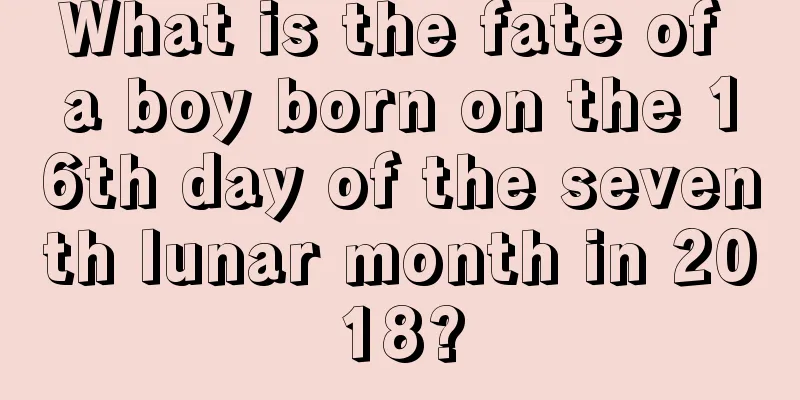Why is the fifth day of the first lunar month called "Po Wu" and what are the customs of Po Wu?

Introduction: The first month of the year is the first month and also a very important month. Therefore, many folk cultural festivals are concentrated in the first month of the lunar year, and different festivals have different customs. So, what are the customs on the fifth day of the first lunar month, and why is the fifth day of the first lunar month called "Po Wu"? Let’s follow the editor to find out. There is no end to the topics about the Spring Festival, so do you want to know more about it? Just continue to wander in Mr. Shui Mo’s Spring Festival special ocean!Why is the fifth day of the Lunar New Year also called "Po Wu"?The fifth day of the first lunar month is commonly known as Po Wu. On this day, a custom called "driving away the five poor" is popular in many places. People get up at dawn, set off firecrackers and clean the place. Firecrackers were set off from every house, and people walked towards the door as they set them off. It is said that all unlucky things and all demons and monsters will be blasted away, and kept as far away from us as possible. In particular, setting off "double-kick firecrackers" (two bangs) is called "collapse of poverty", which can drive away the "bad luck" and "poverty" from the house. People have not worked for four days from the first to the fourth day of the New Year. After setting off firecrackers to break the poverty mark before sunrise, they have to work hard for a whole day, which is called "hating poverty." "Po Wu" means that as long as you work hard and diligently in the new year, you can live a good life. On the morning of "Po Wu", the working people pray for good luck and happiness. On this day, you are not allowed to visit relatives or friends, or visit neighbors, as it is said that visiting relatives will bring bad luck to other people's homes. Cleaning is a thorough housecleaning. Sweep the rubbish out of every house. From the 30th day of the 12th lunar month to the 5th day of the 1st lunar month, cleaning is generally not allowed. You can sweep the floor, but only inside the house, and the garbage can only be placed in the corner of the house. Especially on the first day of the Lunar New Year, not even a broom can be moved, as it is said that if you move it, the good luck will be gone. But on the fifth day of the New Year, you have to do a thorough cleaning. When the garbage was swept out of the door and into a corner, the firecrackers were moved outside the house. Then a huge firecracker was taken, placed on the garbage pile, and lit. With a bang, the ceremony was over. People said: Now, all the poor and needy people have been driven away! So let’s eat.What are the customs for the fifth day of the New Year?This custom is similar in Guanzhong, Dongfu and Xifu. But after firing the cannon, the food eaten is not exactly the same. People in Long County of Xifu eat jiaotuan, saying that they want to use this sticky food to stick away all the unpleasant things. It is said that in some places in the Wei River Valley, people also eat jiaotuan during the Chinese New Year, but not on the fifth day of the New Year, but on the 30th day of the twelfth lunar month, such as Sanyuan County and Wugong County. This is the same as Long County. In Long County, people eat jiaotuan three times during the Chinese New Year, on the 30th day of the twelfth lunar month, the 5th day of the first lunar month, and the 7th day of the first lunar month. In Bin County, people also eat jiaotuan on the fifth day of the first lunar month. It is said that "eat the poor meal and get rid of the root of poverty" or "fill the poor pit". It is also appropriate to use foods such as stir-fried rice to make paste or fill the stomach. People in Bin County say that they can’t eat meat or drink alcohol anyway. In Chunhua County, which is located on the Weibei Plateau, people also eat jiaotuan on this day, which is said to be used to fill the gap in poverty. People are not allowed to go out to visit relatives on this day, as they say they do not want their relatives to be affected by the poverty.The most interesting place is Fengxiang County, the birthplace of the Qin people. It is also called Po Wu. People also get up early, do a thorough cleaning, and set off cannons. However, the food they eat and the etiquette of eating are very different. They eat dumplings. It’s not called dumplings, it’s called boiled dumplings. Wrap it the night before and cook it the next morning. Also stuffed with meat. The trick is that when making dumplings, you have to light a stick of incense, and then circle it over the bowl containing the dumpling stuffing, and then you can make the dumplings. why is that? People in Fengxiang say: This is to gather the "five poor" and the like together, wrap them up, cook them, and eat them. The Qin people were heroic and thorough in their work. What they did was not just to drive away the "five poor", but to kill them all, which was a bit like "eating their flesh and sleeping on their skin". The "Five Poor" are also called the "Five Ghosts". It refers to five types of poor people: poor in intelligence, poor in learning, poor in literature, poor in life, and poor in relationships. It was once seen in Han Yu's "Sending Away Poverty". This great poet said, "These five ghosts are my five troubles," so they must be sent away. No matter what writers think in their hearts, their writing is always relatively peaceful. Although it is a big problem for me, I will still send it off politely. When it comes to the common people, they tell the truth, "drive out the five poor" and "fill the poverty pit", and they use firecrackers and brooms without being polite. After all, this is not a treat or a gift. Killing everyone without mercy is the most passionate and thorough of them all. On the fifth day of the New Year's Eve in Tianjin, every household eats dumplings, and the chopping board must make a clanging sound so that the neighbors can hear it, to show that they are chopping "villains". Tianjin people attribute all the unpleasant things to "villains", and only by getting rid of the "villains" can they have good luck and success. Setting off firecrackers on the fifth night of the New Year also means warding off evil and avoiding disasters. It turned out that on New Year's Eve, when people invited the gods, they forgot about the dirty god. She was so angry that she went to make trouble with Maitreya Buddha. Maitreya Buddha had a smile on his face but did not say a word. This dirty guy was so angry that he beat his chest and stamped his feet, and smoke came out of his seven orifices. Seeing that things were about to get out of hand, Maitreya Buddha spoke up and said, "How about this! Today is the fifth day of the new year. Let people set off a few more firecrackers for you, make dumplings for you, and spend some money for you!" - This is the origin of "Po Wu". Summary: Through the detailed elaboration of the above content, we have a certain understanding of the origin of the fifth day of the first lunar month being called "Po Wu", and we also know the customs of Po Wu. I hope you will like the above content. I wish you all peace, health and good luck in the new year! After reading this article, there are more exciting content in the Spring Festival special topic, let’s take a look! |
>>: The fourth day of the Lunar New Year is “Sheep Day”? Are there any customs?
Recommend
A list of auspicious and inauspicious times on the sixth day of the fifth lunar month in 2020
An overview of the auspicious and inauspicious ti...
Is it good for a girl born on the Dragon Boat Festival in 2021? How is your financial luck?
When it comes to a person's birth, I believe m...
What is the zodiac sign of a Rooster baby born on the 18th day of the sixth lunar month in 2017?
Introduction: Time passes quietly bit by bit, and ...
Is February 25th of the lunar calendar in 2018 an auspicious day?
Introduction: In our country’s traditional culture...
What is the difference between Qingming Festival and Zhongyuan Festival?
What is the difference between Qingming Festival a...
Is the 17th day of the first lunar month in 2020 an auspicious day for bed installation? What are the prospects for marriage, love and career on February 10?
Introduction: Setting up the bed is an important m...
Is February 12 of the lunar calendar in 2017 a good day? Is it suitable for getting married?
Introduction: Getting married is a very important ...
Is it suitable to raise the beams on the day before Jingzhe on the 21st day of the first lunar month in 2021? Analysis of Jingzhe proverbs
Introduction: It is generally necessary to choose ...
Is April 18th of the lunar calendar in 2017 a good day for marriage?
Introduction: Marriage is the best vow of love for...
Is the fate of a boy born on May 24th of the lunar calendar in 2019 good or bad?
The birth of a child is a great blessing from God ...
Where is the God of Wealth on the 14th day of the second lunar month in 2018?
A year's plan begins with spring. The wind in...
What are the do's and don'ts on the fifth day of the ninth lunar month in 2017?
The falling leaves indicate the beginning of autu...
Can I visit the graves in advance during the Ghost Festival? Is it a bad idea to move house on the 15th day of the seventh lunar month in 2020?
Introduction: Tomb sweeping is one of the festival...
Can I move into a new house on the third day of March 2020? When is the Shangsi Festival on the third day of March 2020?
Introduction: It is generally necessary to choose ...
Analysis of the 19th day of April in the lunar calendar in 2021. Is it possible to travel on that day?
The pros and cons of traveling at different times ...









